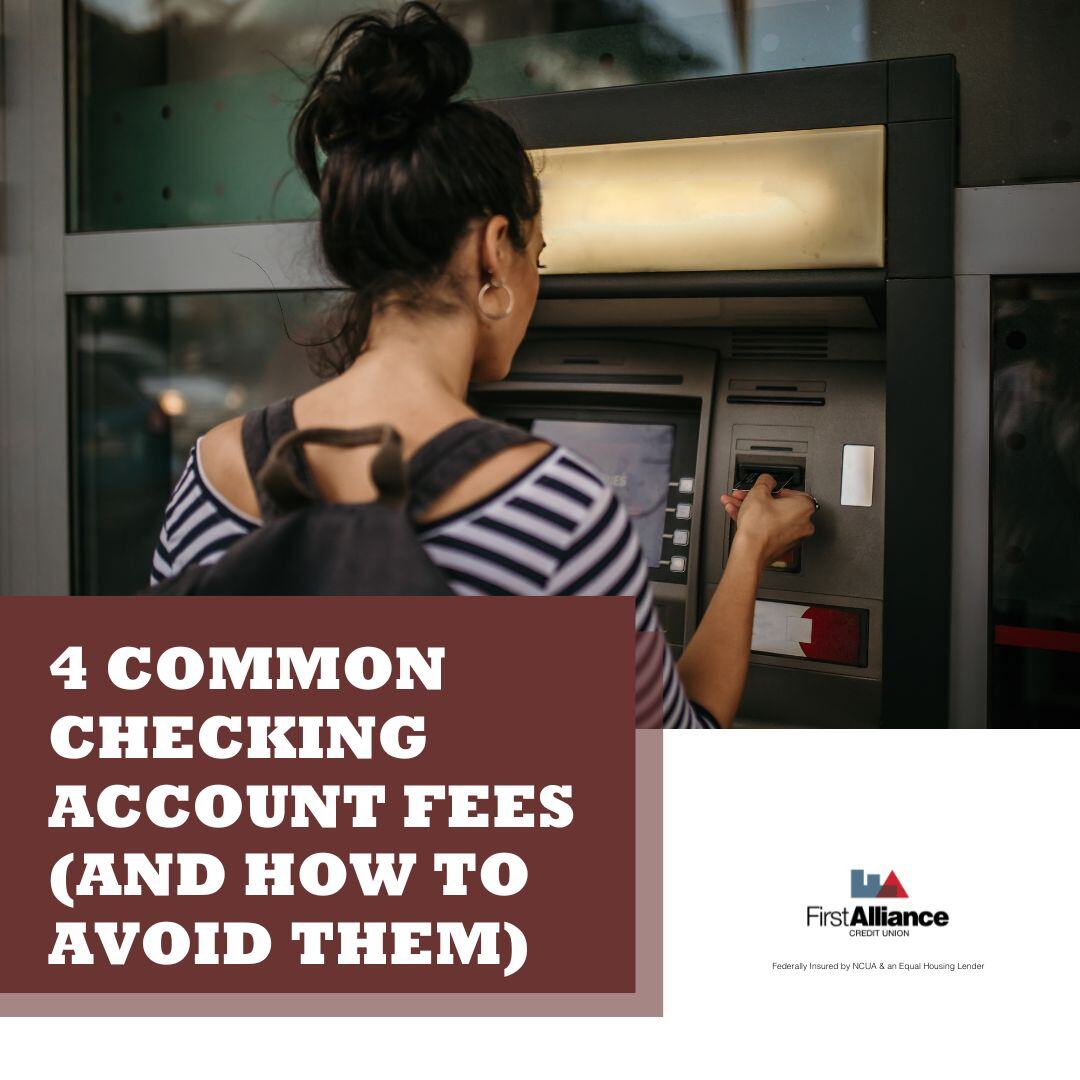4 Common Checking Account Fees (and how to Avoid Them)
Let’s be honest—while there are some checking account fees you want to avoid at all costs, such as a monthly fee, there are a lot of fees that are...
3 min read
![]() First Alliance Credit Union
:
May 20, 2021 6:00:00 PM
First Alliance Credit Union
:
May 20, 2021 6:00:00 PM

If you’re new to the world of financial institutions, you might wonder why you need a checking account as well as a savings account. After all, don’t you just need a place to keep your money while you’re not spending it?
In fact, checking accounts are the unsung workhorse of almost every bank account. Once you understand all they can do for you, you’ll never want to be without one.
.png?width=1200&height=630&name=MicrosoftTeams-image%20(32).png)
A checking account’s biggest feature is also its most basic—it keeps your money safe. When you put your money in a checking account, you don’t have to worry about being robbed and losing it all or losing your money due to a fire or flood.
Even better, your money is insured. So long as you have under $250,000 in your checking (or savings) account, your money is insured by the National Credit Union Association (NCUA) for credit unions, and the Federal Deposit Insurance Corporation (FDIC) for banks. In other words, no matter what happens, when you deposit money into a checking account that money will still be there when you come back for it.
While keeping your money safe is fantastic, you need to have money in your account first. That’s why most financial institutions offer several ways to deposit money into your checking account.
One of the most popular options is using direct deposit to have your paycheck sent directly to your account as soon as it’s issued. You don’t have to physically take your paycheck to a financial institution to cash it, and you don’t have to wait for the check to clear before the funds are deposited in your account.
Of course, you’ll probably get money from other sources than a paycheck, like a relative writing you a check for the holidays or your birthday. When you get one, you’ll want to have a checking account ready to receive it. Unlike the check cashing services at big box retail stores, depositing a check in a checking account costs nothing, and many financial institutions will even let you deposit a check through their mobile app for added convenience.
If you need to deposit cash, you can always visit a financial institution’s branch and deposit it in person. It’s worth pointing out that First Alliance Credit Union’s Advisor Supported Kiosks let you deposit both money and checks any time of day.
A checking account also lets you access your money in different ways. Thanks to the magic of debit cards, for instance, you can use the money in your checking account at almost any retail store the same way you would if you had cash.
If you need to use actual cash, though, you can always visit an ATM and withdraw the money you need. Even better, if you use one of First Alliance Credit Union’s Advisor Supported Kiosks, you can get your cash withdrawal in denominations of $1, $5, $20 or even $100.
While you can use a check to pay your bills if you want, if your financial institution has an electronic BillPay service you can send money to your creditors directly from your checking account. With First Alliance Credit Union’s online banking platform, for instance, you can get electronic bills delivered directly to your account, as well as a reminder when they’re due. You can even set up an automatic payment and never have a late payment again.
As you deposit money and withdraw it from your account, day by day you’ll create a record of where and how you’ve spent your money. This paper trail can help you prove you made a payment, which can be extremely useful if a creditor claims they haven’t been paid.
This paper trail can also be incredibly useful when creating a budget. You can look at all the payments you’ve made in the past month and see what you’ve spent where. From there, you can figure out your current budgeting categories and how much you spend on each category.
There are some people who might have noticed that checking accounts share a lot of features with savings accounts. Like checking accounts, savings accounts keep your money safe and offer many options for depositing money in it. You can even withdraw money from a savings account and use it to pay bills.
However, checking accounts have one advantage over savings accounts—you can withdraw money from a checking account as often as you like. Some savings accounts only offer a limited number of transactions before you have to pay a fee to withdraw money from them, but checking accounts are designed to handle constant deposits and withdrawals, so there are no limits on the amount of transactions you can make.
There are a lot of reasons why you should have a checking account, from being able to manage your money more effectively to just keeping your money safe.
If you’d like to see just how effective a checking account can be at helping you manage your money, become a member of First Alliance Credit Union today. You can deposit and withdraw both money and checks at any time using our Advisor Supported Kiosks, and our robust online banking platform and mobile app will help you pay creditors and monitor your accounts no matter where you are.

Let’s be honest—while there are some checking account fees you want to avoid at all costs, such as a monthly fee, there are a lot of fees that are...

Opening up a checking account at a new financial institution can be kind of exciting, because you get to explore all the features your new financial...

If you’ve been looking at opening up a new checking account, you might have heard that some financial institutions offer rewards checking accounts....